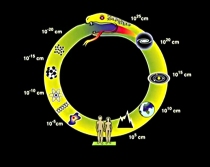Category Archives: Talks

RI’s ‘Forbidden crystal symmetry in mathematics and architecture’ what’s not to like?
RI event ‘Forbidden crystal symmetry in mathematics and architecture’ Yesterday evening I went to an event at The Royal Institution (London) for the first time. When I was doing my MA at the Royal College of Art, the lovely artist/lecturer Jo

RI’s ‘Forbidden crystal symmetry in mathematics and architecture’ what’s not to like?
RI event ‘Forbidden crystal symmetry in mathematics and architecture’ Yesterday evening I went to an event at The Royal Institution (London) for the first time. When I was doing my MA at the Royal College of Art, the lovely artist/lecturer Jo

Ute Meta Bauer and Iwona Blazwick reflects on ‘NowHere’ (1996)
Ute Meta Bauer and Iwona Blazwick reflects on ‘NowHere’ (1996) Curator Ute Meta Bauer reflected upon three of her exhibitions on Thursday 24 January 2013 in a conversation with curator Iwona Blazwick at the Whitechapel Gallery, London. I have waited

Ute Meta Bauer and Iwona Blazwick reflects on ‘NowHere’ (1996)
Ute Meta Bauer and Iwona Blazwick reflects on ‘NowHere’ (1996) Curator Ute Meta Bauer reflected upon three of her exhibitions on Thursday 24 January 2013 in a conversation with curator Iwona Blazwick at the Whitechapel Gallery, London. I have waited

Big, Bang, Biospheres and Beyond ; Astronomer Lord Martin Rees
In November 2012, I went to the Annual Science Lecture at the Natural History Museum given by Lord Martin Rees. A brilliant talk about the origins of the universe, the possibility of life elsewhere and the future where space exploration will be

Big, Bang, Biospheres and Beyond ; Astronomer Lord Martin Rees
In November 2012, I went to the Annual Science Lecture at the Natural History Museum given by Lord Martin Rees. A brilliant talk about the origins of the universe, the possibility of life elsewhere and the future where space exploration will be

Kathryn Schulz: On being wrong
“The miracle of your mind isn’t that you can see the world as it is. It’s that you can see the world as it isn’t”. Thought provoking stuff and a great talk by Kathryn Schulz.

Kathryn Schulz: On being wrong
“The miracle of your mind isn’t that you can see the world as it is. It’s that you can see the world as it isn’t”. Thought provoking stuff and a great talk by Kathryn Schulz.

DOROTHEA ROCKBURNE: 1970
http://www.moma.org This early work by Dorothea Rockburne is a favourite of mine. I came across it in 2008 at MOMA (see link above) and I was reminded about it last week when I went to a talk by art historian Dr.

DOROTHEA ROCKBURNE: 1970
http://www.moma.org This early work by Dorothea Rockburne is a favourite of mine. I came across it in 2008 at MOMA (see link above) and I was reminded about it last week when I went to a talk by art historian Dr.
Consciousness: The hard problem?
The Guardian science correspondent Alok Jha is having a conversation with Dr Anil Seth, Prof Barry Smith, and Prof Chris Frith about consciousness.
Consciousness: The hard problem?
The Guardian science correspondent Alok Jha is having a conversation with Dr Anil Seth, Prof Barry Smith, and Prof Chris Frith about consciousness.

Royal Academy of Arts Annual Lecture; Richard Tuttle in conversation with Richard Shiff
Richard Tuttle was discussing his work with Richard Shiff (Professor of Modern and Contemporary Art at the University of Texas) at the Royal Academy of Arts. Shiff started the conversation by introducing Tuttle’s piece “3rd Rope Piece” (1974) as seen above.

Royal Academy of Arts Annual Lecture; Richard Tuttle in conversation with Richard Shiff
Richard Tuttle was discussing his work with Richard Shiff (Professor of Modern and Contemporary Art at the University of Texas) at the Royal Academy of Arts. Shiff started the conversation by introducing Tuttle’s piece “3rd Rope Piece” (1974) as seen above.
Still Photography?
Panel discussions are interesting set ups that beautifully mirror social interactions generally. Are people on the panel generally interested in each others views? Or is it simply a case of getting your word in…not worrying about quality but rather aiming for quantity?
Still Photography?
Panel discussions are interesting set ups that beautifully mirror social interactions generally. Are people on the panel generally interested in each others views? Or is it simply a case of getting your word in…not worrying about quality but rather aiming for quantity?